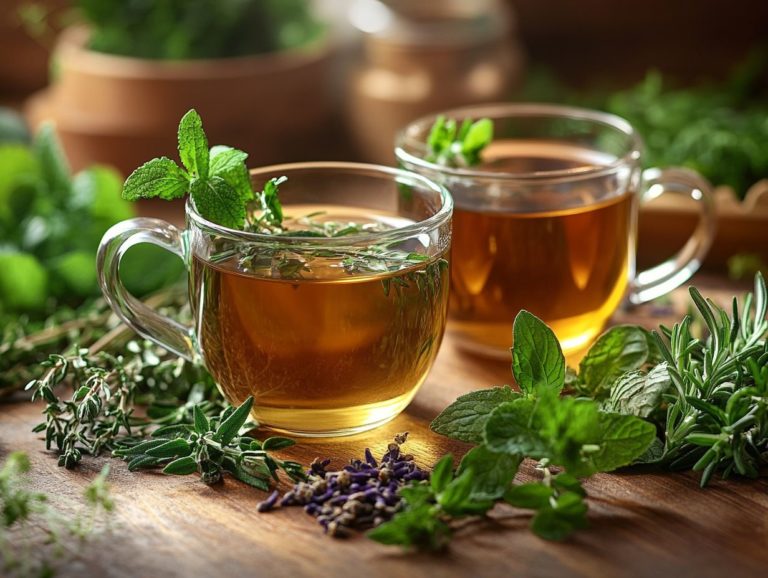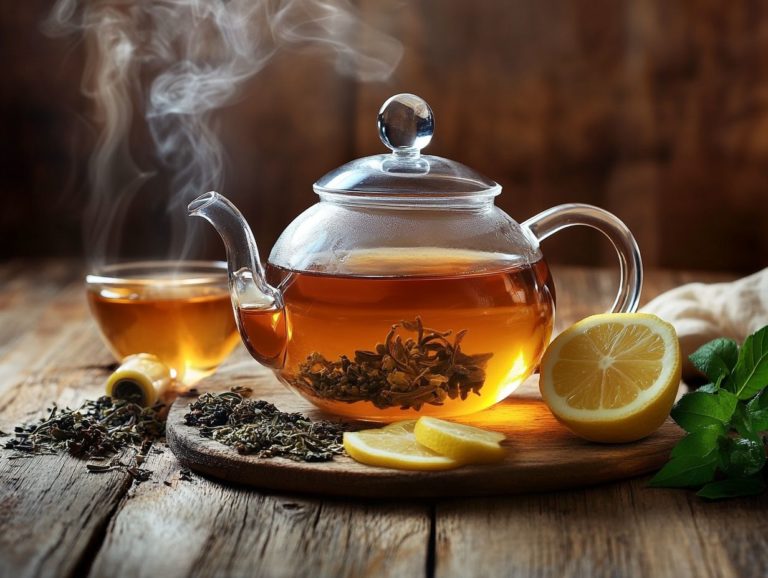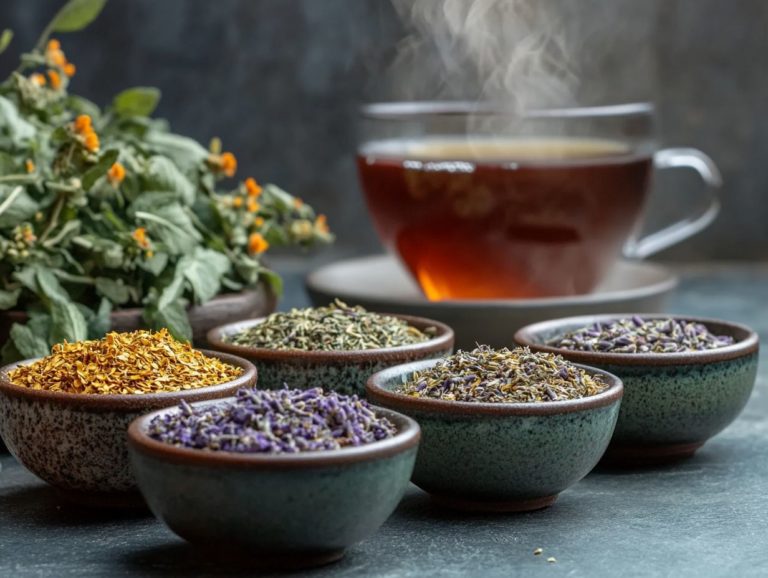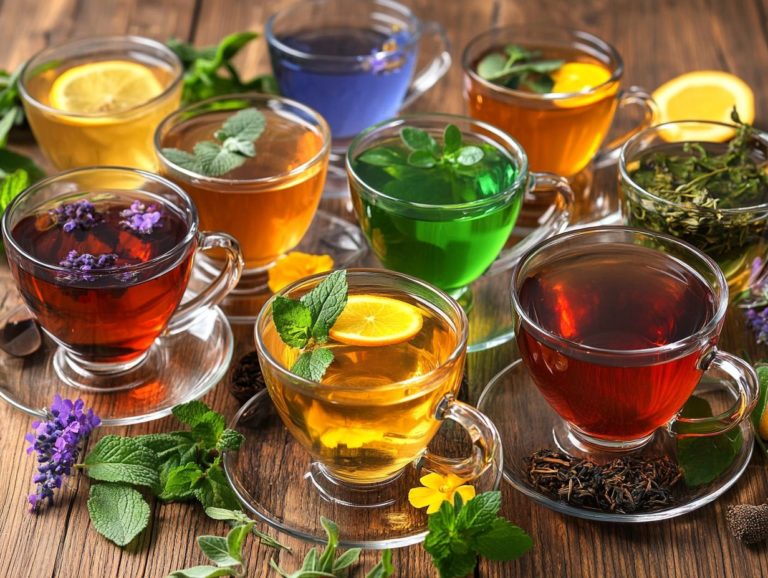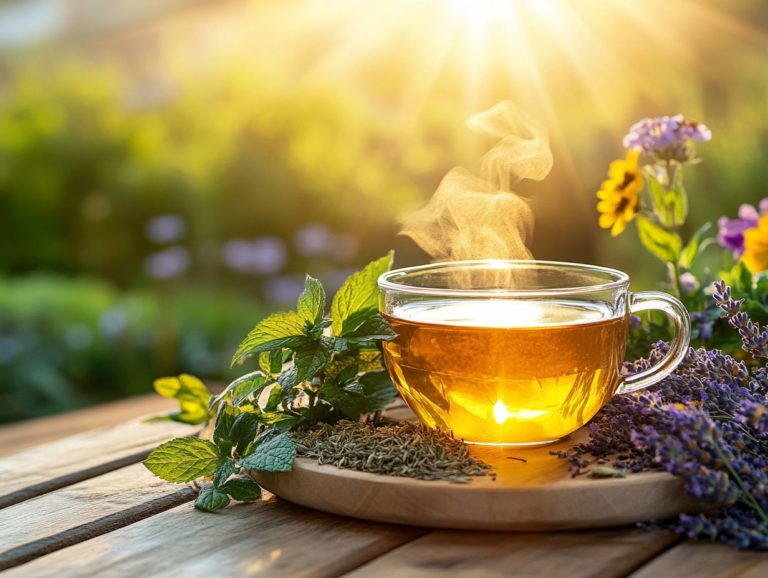5 Herbal Teas to Soothe Your Cold Symptoms
When a cold strikes, finding relief can seem like an uphill battle. Fortunately, nature provides comforting solutions in the form of herbal teas.
Here are five potent options peppermint, ginger, echinacea, chamomile, and elderberry that not only soothe your symptoms but also offer a wealth of additional health benefits.
You ll explore how these teas can assist you, their preparation methods, and when it s wise to seek professional help. Brew a cup, settle in, and uncover the healing power of herbal teas!
Contents
- Key Takeaways on Herbal Teas for Cold Relief:
- 1. Peppermint Tea
- 2. Ginger Tea
- 3. Echinacea Tea
- 4. Chamomile Tea
- 5. Elderberry Tea
- What Are the Common Symptoms of a Cold?
- Frequently Asked Questions
- What are the benefits of drinking herbal teas to soothe cold symptoms?
- Which herbal teas are best for soothing cold symptoms?
- Can herbal teas help prevent a cold?
- How should I prepare herbal teas for maximum benefits?
- Are there any side effects of drinking herbal teas for cold relief?
- Can I mix different herbal teas to create a potent cold relief blend?
Key Takeaways on Herbal Teas for Cold Relief:
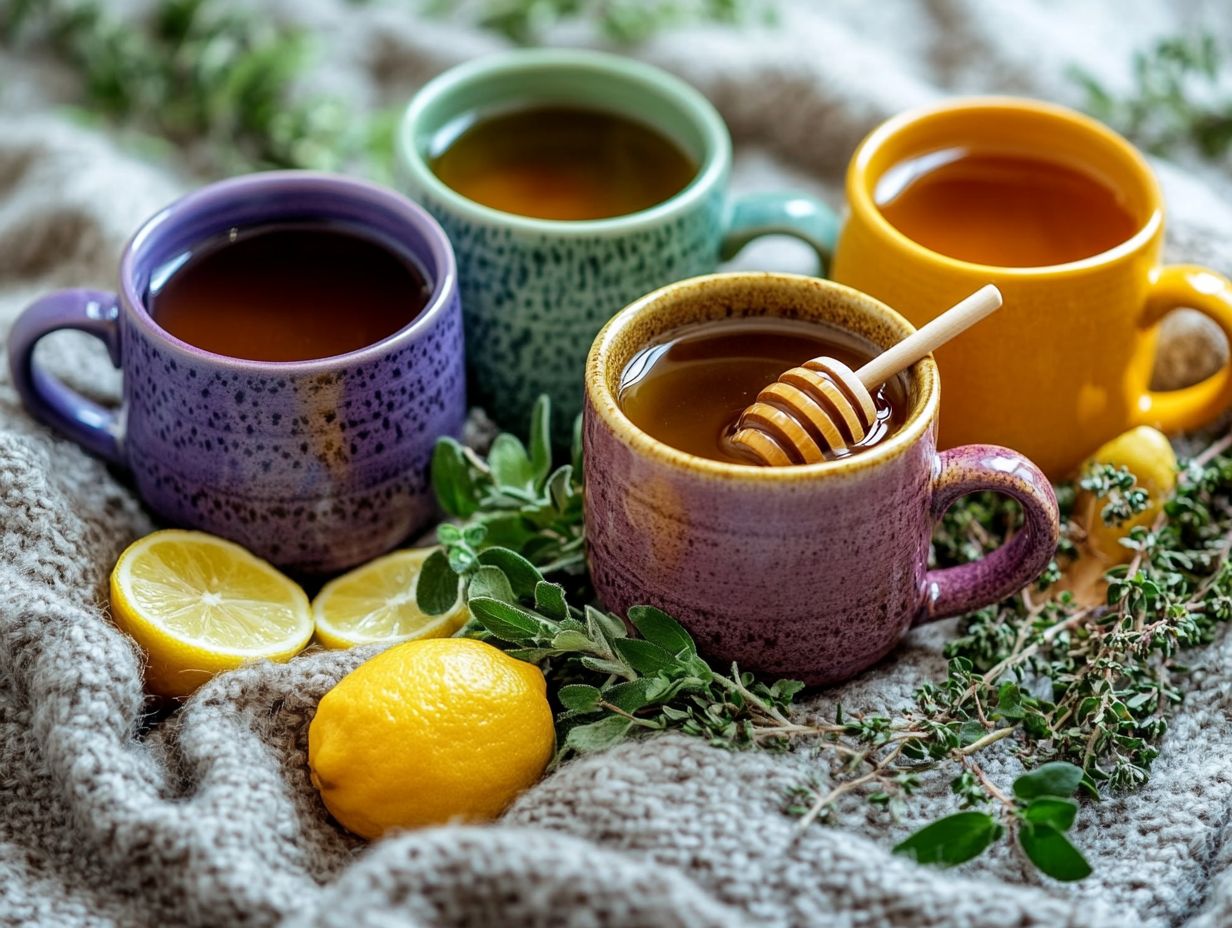
- Peppermint tea can help alleviate congestion, soothe sore throats, and provide relief from headaches associated with colds.
- Ginger tea has natural anti-inflammatory properties and can help with nausea, coughs, and headaches caused by colds.
- Echinacea tea can boost your immune system and help fight the common cold virus.
1. Peppermint Tea
Peppermint tea is your go-to for a refreshing flavor and an array of potential health benefits, especially when you’re dealing with colds. This delightful herbal infusion, derived from the peppermint plant, offers a soothing experience while helping fight viruses.
With its unique blend of menthol and antioxidants, it can help relieve sinus congestion and calm sore throats. Plus, peppermint tea aids digestion, making it a favored choice among natural remedies for colds.
Its calming aroma and properties reduce stress and anxiety, promoting relaxation during challenging days of illness.
So, think of peppermint tea not just as a soothing beverage, but as a versatile ally in your journey toward better health!
2. Ginger Tea
Ginger tea stands out as a revered herbal remedy, celebrated for its ability to alleviate cold and flu symptoms while offering health benefits through its natural anti-inflammatory properties. Enhance its effects by adding a touch of honey or lemon!
This comforting beverage is made from fresh ginger root, known for its natural compounds, gingerol and shogaol, which help reduce inflammation. For those dealing with seasonal allergies, trying DIY herbal remedies like ginger tea can soothe sore throats and relieve congestion while also boosting your immune health, helping your body fend off illnesses.
Crafting ginger tea is a breeze: simply slice fresh ginger and steep it in boiling water for about 10 minutes. Its versatility makes it not just a winter remedy; it also supports digestive health and alleviates nausea.
Don t miss out on the incredible benefits of ginger tea!
3. Echinacea Tea
Echinacea tea is an herbal infusion known for its remarkable ability to strengthen your immune system and alleviate cold symptoms. It s a favored choice for those who prefer natural remedies during flu season. Combining it with ginseng can further enhance its immune-boosting effects.
This delightful brew not only wraps you in soothing warmth but also taps into the antiviral properties of the echinacea plant, which can help inhibit viral replication.
Preparing this tea is easy; simply steep dried echinacea leaves or flowers in hot water for about 10 to 15 minutes. Regular consumption may enhance your white blood cell activity, which is key for warding off pathogens.
With its rich array of antioxidants, echinacea tea promotes overall immune health, making it a valuable addition to your wellness routine.
Try these herbal teas today and take the first step toward feeling better fast!
4. Chamomile Tea
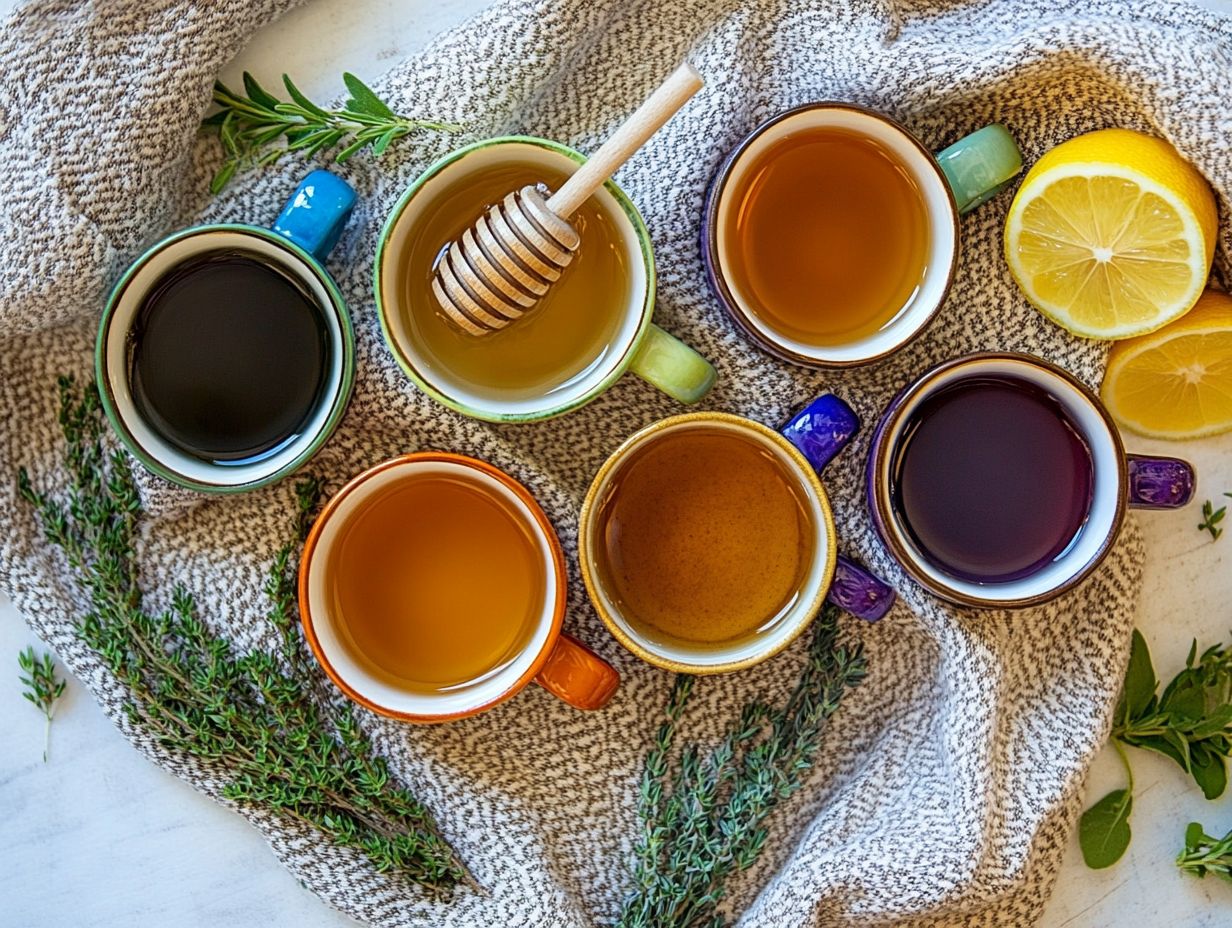
Chamomile tea is a true gem, cherished for its calming effects. It serves as a comforting remedy, especially when you re grappling with colds and flus.
Chamomile tea promotes relaxation and offers a host of health benefits. This herbal tea stands out for its ability to soothe sore throats and alleviate anxiety, making it the perfect ally for both physical discomfort and emotional stress.
When brewed just right, chamomile tea unveils essential oils that enhance its soothing properties. It grants relief from cold symptoms, while the warm steam acts as a gentle balm, clearing your nasal passages.
Simply steeping dried chamomile flowers in hot water allows you to easily incorporate this delightful beverage into your daily routine. This paves the way for overall wellness and relaxation.
5. Elderberry Tea
Elderberry tea shines with its remarkable immune-boosting properties. It is an effective herbal remedy for cold and flu symptoms.
This fragrant brew bursts with antioxidants that invigorate your immune system. Incorporate elderberry tea into your routine to strengthen your body s defenses.
To craft a soothing cup, simply steep dried elderberries or a pre-packaged elderberry tea bag in hot water for about 15 minutes. For the best results, enjoy 1-2 cups daily during the cold season to maximize its protective effects.
This can be complemented by other herbal blends for enhanced benefits. Don t wait for the cold season to start; begin your daily tea routine now!
What Are the Common Symptoms of a Cold?
Common symptoms of a cold can range from mild discomfort to more severe issues. They impact your immune system and lead to various physical ailments like congestion, sore throat, cough, and fatigue.
Understanding these symptoms is crucial for effectively navigating through colds and flus. These manifestations not only disrupt your daily routine but can also diminish productivity, hinder social interactions, and affect your overall mood.
For instance, that persistent cough and sore throat can make speaking a chore. Additionally, congestion can seriously mess with your sleep quality.
Incorporating herbal teas can serve as a soothing natural remedy. Herbal teas, with their comforting warmth and plethora of beneficial ingredients, serve as practical natural remedies to ease these uncomfortable symptoms.
Blends of chamomile, ginger, or peppermint can provide soothing relief, promoting relaxation and hydration both essential for a quicker recovery. By weaving delightful DIY herbal teas into your daily routine, you can take meaningful steps toward alleviating discomfort and boosting your resilience against future ailments.
How Do Herbal Teas Help with Cold Symptoms?
Herbal teas serve as your effective natural remedy for alleviating cold symptoms. Their unique blends of ingredients like hibiscus and licorice root support immune health and soothe discomfort.
Among these, ginger tea stands out with its anti-inflammatory properties. It helps reduce throat irritation and ease congestion.
Chamomile is another powerful ally; it promotes relaxation and is packed with antioxidants that may enhance your body’s defenses. Peppermint tea offers a refreshing escape, relieving sinus pressure with its menthol content.
Together, these herbal infusions tackle immediate discomfort and fortify your immune response, assisting you in a quicker recovery from illness.
Start your journey to better health today with these soothing herbal teas!
What Are the Other Benefits of These Herbal Teas?
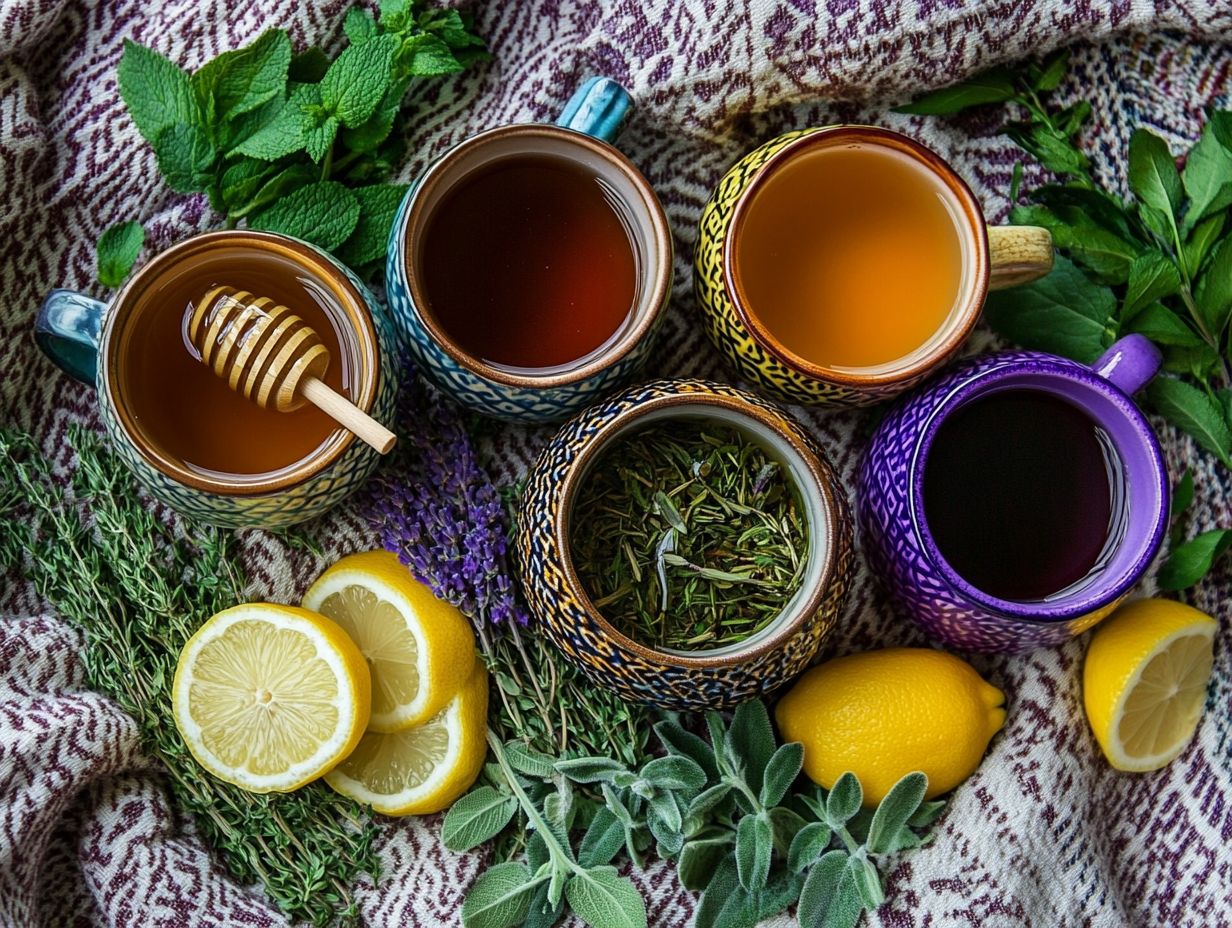
The benefits of herbal teas go beyond easing cold symptoms. They offer many health advantages, like powerful antioxidant properties and overall wellness through herbal medicine, including vitamin C from lemon.
Incorporating herbal teas into your daily routine can boost your well-being. For instance, they support digestion by soothing bloating and discomfort. Many herbal blends are known for their calming effects, providing stress relief amidst daily pressures. Additionally, exploring 10 herbal infusions for immune support can further enhance your health.
Antioxidants in these brews play a crucial role in promoting health. They help combat free radicals, enhance immune function, and ward off illnesses. Each cup you brew not only serves as a comforting ritual but also contributes to a balanced and healthier lifestyle.
How Can These Teas Be Prepared and Consumed?
Preparing and enjoying herbal teas can be delightful. You have countless methods to enhance their flavors and health benefits. For example, add a splash of lemon or a drizzle of honey for an extra soothing touch, or blend different teas like hibiscus and chamomile for an exciting taste.
To elevate your tea journey, consider exploring different brewing techniques. Steeping for various lengths of time or using loose leaf instead of tea bags can make a big difference. Start with fresh herbs whenever possible for a more potent flavor.
Feel free to experiment with additional ingredients. Perhaps add a dash of ginger for a spicy kick or some mint for a refreshing twist. These choices allow you to create unique blends tailored to your taste.
Pairing your teas with lemon not only adds zest but also boosts your vitamin C intake. Honey serves as a natural sweetener, enhancing the soothing properties of each cup. Transform your tea into a health-enhancing ritual.
Are There Any Potential Risks or Side Effects of These Teas?
While herbal teas are generally safe, it s wise to be aware of potential risks and side effects. Specific herbal blends might interact negatively with medications or worsen existing conditions, possibly leading to discomfort or serious complications.
- Digestive issues
- Allergic reactions
- Dizziness
If you have pre-existing conditions like diabetes or hypertension, exercise caution. Certain herbs can significantly influence blood sugar levels or blood pressure. Before adding new herbal teas to your routine, consult a healthcare professional to ensure your safety and well-being.
When Should One Consult a Doctor Instead of Using Herbal Teas for Colds?
Knowing when to consult a doctor rather than relying solely on herbal teas for colds is vital, especially if symptoms worsen or linger. If you experience severe throat pain, especially with a high fever or difficulty breathing, it could signal a serious infection requiring immediate medical attention.
If a persistent cough lasts more than a week, or if you experience wheezing or chest tightness, these may indicate bronchitis or another respiratory issue that requires professional assessment.
While herbal remedies offer comfort and support, recognize their limitations, especially when symptoms could escalate into serious complications if not addressed promptly.
Frequently Asked Questions
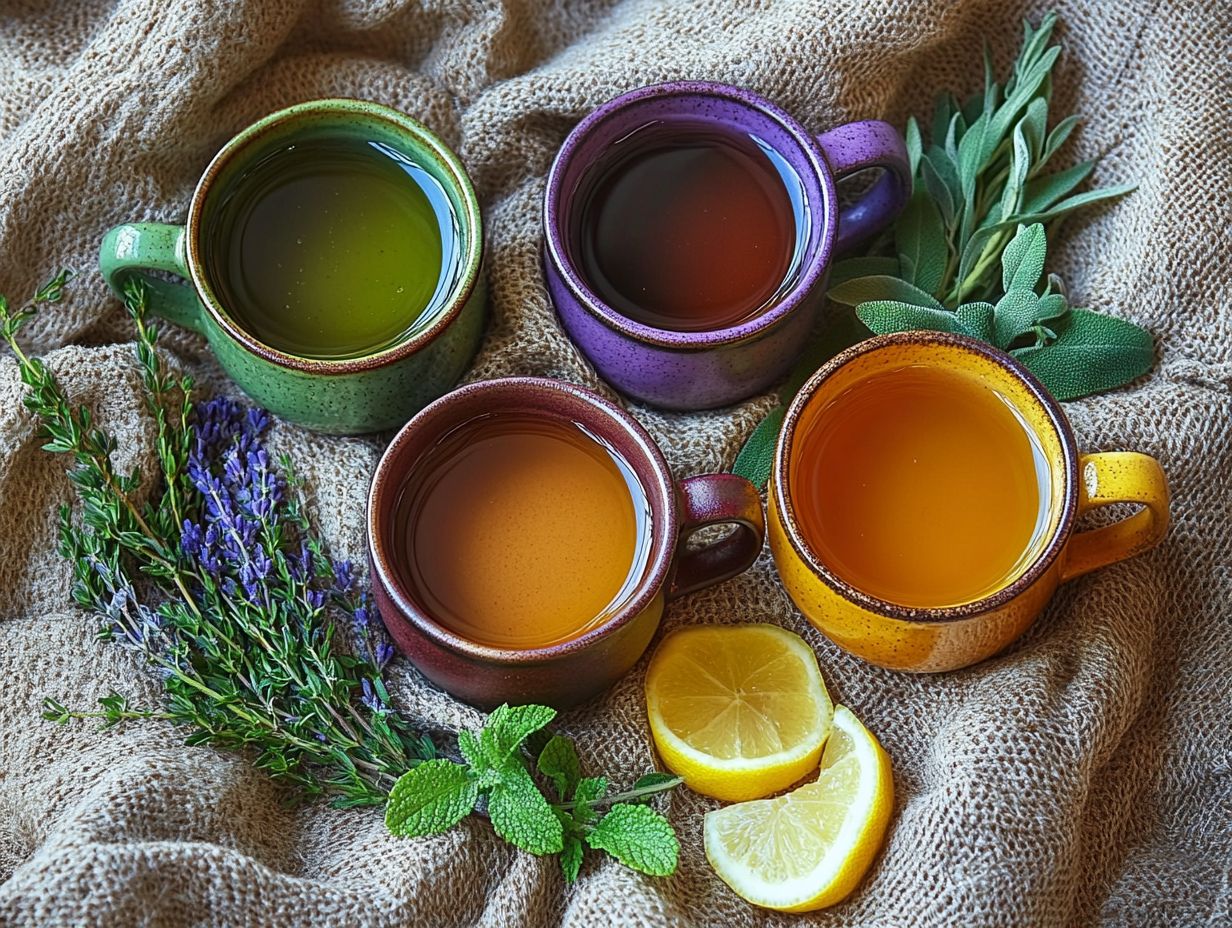
What are the benefits of drinking herbal teas to soothe cold symptoms?
Herbal teas can relieve sore throats, congestion, and coughing. They may also boost your immune system, helping you recover faster from a cold.
Which herbal teas are best for soothing cold symptoms?
Popular options include peppermint, chamomile, ginger, elderberry, and echinacea teas. Each offers unique benefits to help reduce cold symptoms.
Can herbal teas help prevent a cold?
Drinking herbal teas can’t guarantee you’ll avoid a cold. However, they can strengthen your immune system and lower your chances of getting sick.
How should I prepare herbal teas for maximum benefits?
To prepare herbal teas, steep one teaspoon of dried herbs in a cup of hot water for 5 10 minutes. Cover the cup to keep the steam in, then strain and enjoy while warm.
Are there any side effects of drinking herbal teas for cold relief?
Most herbal teas are safe, but it’s wise to consult your doctor before trying new remedies. Some herbs may interact with medications, so caution is key.
Can I mix different herbal teas to create a potent cold relief blend?
Yes! Mixing herbs can create a powerful blend for cold relief. Just be sure to research the herbs beforehand and check with your doctor if you have any concerns.

